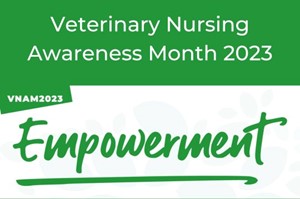
For the month of May we are celebrating our wonderful veterinary nurses and what empowers them to be great at what they do.
We will be exploring what empowers and inspires our veterinary nurses to deliver excellent care for your pets. We aim to showcase the myriad of jobs our veterinary nurses have within our practice team and across the wider veterinary industry. Below you will learn about what Veterinary Nursing Awareness Month is and the roles our exceptional nurses play on a day-to-day basis. By outlining the different entry routes available we will demonstrate how you can join the veterinary nursing profession. If you are looking for an empowering, inspiring career, Veterinary Nursing could be for you.
We hope you’ll join us in our celebration, from all the team at Calder Vets.
What is Veterinary Nurse Awareness Month?
Since 2005, every May, we have celebrated Veterinary Nursing Awareness Month. The celebratory month, led by the British Veterinary Nursing Association (BVNA), aims to raise awareness of the importance of the role of the Registered Veterinary Nurse (RVN).
Our Veterinary nurses are an integral part of our veterinary team at Calder Vets and are vital for the smooth running of our practice.
As well as providing expert nursing care for poorly animals, our veterinary nurses play an important role in supporting pet owners in keeping their pets healthy. They carry out essential clinical work and are skilled in performing diagnostic tests, treatments and can be delegated minor surgical procedures. Our registered veterinary nurses have the technical knowledge and hands-on expertise to care for animals with skill and empathy.
The registered veterinary nurse (RVN) title is used by our nurses who have undergone extensive training and education. Once they’ve passed their final nursing exams, all nurses are entered onto the VN register and are regulated by the Royal College of Veterinary Surgeons (RCVS). They follow the Code of Professional Conduct for Veterinary Nurses, which includes the requirement to undertake continuing professional development (CPD) to keep their skills up to date.
At Calder Vets, we are extremely proud of our veterinary nurses who are dedicated to supporting our clients and their pets at Calder Vets.
To meet our exceptional nursing team, click here.
What roles do our veterinary nurses have?
Our veterinary nurses have a complex yet diverse role in our practice, with no two days ever the same. Here are just a few fundamental roles they carry out regularly:
- They provide in-patient care
- They monitor anaesthesia and sedated pets
- They take blood samples and place intravenous catheters
- They take radiographs
- They provide dietary advice
- They support owners during bereavement
- They manage our dispensary
- They provide intensive care to critical patients
- They support patients who are whelping
- They provide first aid
- They manage and package up laboratory samples
- They provide weight management advice
- They provide a nurse consultation service
- They provide dental care
- Scrubbing into surgical cases and assisting the surgeon
- Provide sterile supplies management and maintenance
- Carry out minor surgical procedures
- Provide aftercare for patients post procedures
Are you interested in becoming a Veterinary Nurse?
How can I become a Registered Veterinary Nurse?
There are two main routes, a vocational route through a level 3 diploma or a degree route.
Vocational
Those who prefer to complete on the job training may prefer to go to college and work within practice whilst they complete their qualification (vocational route). The Level 3 Veterinary Nursing diploma can either be completed through day release where you attend college one day a week alongside work. Or it can be completed as block releases in college where you spend a period of time learning the theory before going back to practice. This route is also available as an apprenticeship, which gives you the opportunity to be paid whilst you study and to have your course fees funded.
If you’re interested in the apprenticeship route, the first step onto this pathway is often to look for a position as a Patient Care Assistant (PCA) where you can gain experience within a veterinary practice. These positions are offered within the Linnaeus practices across the UK; find out more here. That PCA position may lead to a paid apprenticeship within that practice to complete your qualification as an RVN.
Certain entry requirements need to be met to allow you to complete the course.
These tend to be 5 GCSEs at grades A*-C (or 9-4), including English Language, Mathematics, and a science subject, however, the requirements can vary between course providers. If you do not meet these requirements, alternative qualifications may be acceptable. It’s always worth contacting the course provider running the courses to find out more details.
Degree
The other route is the degree option. This is where you attend university and gain a degree and your Registered Veterinary Nursing qualification. You will spend periods of time learning the theory of veterinary nursing at university and then attend blocks of clinical placement within a veterinary practice. This option offers you the opportunity to experience university life and brings the potential to be taught by world-leading veterinary clinicians. Some universities run the veterinary nursing course alongside another discipline, such as companion animal behaviour or rehabilitation, providing you with another area of knowledge and opportunities to develop further qualifications within that additional area. You can explore the various courses by checking out the UCAS website.
Entry requirements vary depending on the university you are applying to. You can find information for each university course through the UCAS website above.
If you’re looking for a fast-paced career where each day will be different, veterinary nursing could be for you!
Join the Linnaeus family…
Are you a Student Veterinary Nurse or a Registered Veterinary Nurse looking for a new challenge with us at Calder Vets? Linnaeus has many opportunities to explore. Click here to discover the current nursing vacancies across our group.


News